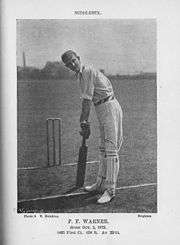Pelham Warner
 "Plum" as caricatured by Spy (Leslie Ward) in Vanity Fair, September 1903 | ||||||||||||||||||||||||||||||||||||||||
| Personal information | ||||||||||||||||||||||||||||||||||||||||
|---|---|---|---|---|---|---|---|---|---|---|---|---|---|---|---|---|---|---|---|---|---|---|---|---|---|---|---|---|---|---|---|---|---|---|---|---|---|---|---|---|
| Full name | Pelham Francis Warner | |||||||||||||||||||||||||||||||||||||||
| Born |
2 October 1873 Port of Spain, Trinidad | |||||||||||||||||||||||||||||||||||||||
| Died |
30 January 1963 (aged 89) West Lavington, Sussex, England | |||||||||||||||||||||||||||||||||||||||
| Nickname | Plum | |||||||||||||||||||||||||||||||||||||||
| Batting style | Right-handed | |||||||||||||||||||||||||||||||||||||||
| Bowling style | Right arm slow | |||||||||||||||||||||||||||||||||||||||
| International information | ||||||||||||||||||||||||||||||||||||||||
| National side | ||||||||||||||||||||||||||||||||||||||||
| Test debut (cap 118) | 14 February 1899 v South Africa | |||||||||||||||||||||||||||||||||||||||
| Last Test | 26 June 1912 v Australia | |||||||||||||||||||||||||||||||||||||||
| Domestic team information | ||||||||||||||||||||||||||||||||||||||||
| Years | Team | |||||||||||||||||||||||||||||||||||||||
| 1894–1920 | Middlesex | |||||||||||||||||||||||||||||||||||||||
| 1894–96 | Oxford University | |||||||||||||||||||||||||||||||||||||||
| Career statistics | ||||||||||||||||||||||||||||||||||||||||
| ||||||||||||||||||||||||||||||||||||||||
| Source: Cricinfo, 11 November 2008 | ||||||||||||||||||||||||||||||||||||||||
Sir Pelham Francis Warner MBE (2 October 1873 – 30 January 1963), affectionately and better known as Plum Warner or "the Grand Old Man" of English cricket, was a Test cricketer.
Early life
Warner was born in Port of Spain, Trinidad. His mother, Rosa Cadiz, was of Spanish origin, his father of an English colonial family.[1] He was educated at Harrison College, and then sent to England to Rugby School and Oriel College, Oxford.
Cricket career

As a right-hand batsman, Warner played first-class cricket for Oxford University, Middlesex and England. He played 15 Test matches, captaining in 10 of them, with a record of won 4, lost 6. He succeeded in regaining The Ashes in 1903–04, winning the series against Australia 3–2. However he was less successful when he captained England on the tour of South Africa in 1905–06, suffering a resounding 1–4 defeat, the first time England had lost to South Africa in a Test match. He was also to have captained England on the 1911–12 tour of Australia, but fell ill. He was unable to play in any of the Tests, with Johnny Douglas taking over the captaincy.
He was named Wisden Cricketer of the Year in 1904 and also in 1921, making him one of two to have received the honour twice (the usual practice is that it is only won once: the other is Jack Hobbs). The second award marked his retirement as a county player after the 1920 season, in which he captained Middlesex to the County Championship title.
In the mid 1920s he was Chairman of Selectors, and in 1926 during industrial strife served as a Special Constable.[2] He did not, however, play in another first-class fixture until 1926–27, when he captained an MCC side to Argentina, in which the four representative matches against the host nation were accorded first-class status. MCC scraped a win in the series by 2 games to one, with one match drawn. He played one more first-class match, in 1929 for the MCC against the Royal Navy.
Cricket management
After retiring as a player, he became a tour manager, most notably on the infamous Bodyline tour of Australia in 1932–33. He was the chairman of the England Test selectors for several years in the 1930s. He later became President of the Marylebone Cricket Club. He was knighted for his services to cricket in 1937.
Cricket writing
Warner wrote extensively on cricket. He detailed his Ashes Tests and a history of Lord's Cricket Ground. He founded The Cricketer magazine. He was cricket correspondent of the Morning Post from 1921 to 1933, and subsequently of the Daily Telegraph.
Family life
He married Agnes in the summer of 1904 and had two sons, Esmond and John, and a daughter, Elizabeth. He died, aged 89, at West Lavington, West Sussex.
His brother Aucher Warner not only captained the first combined West Indies side in the West Indies during the 1896–97 season (playing against A. A. Priestley's XI and for Trinidad vs. Lord Hawke's touring team, which included Pelham Warner) but also the first West Indian touring side to England in 1900.[1]
Marina Warner, novelist and mythographer, is his granddaughter.[1][3]
References
- 1 2 3 Warner, Marina (11 June 2004). "My grandfather, Plum". The Guardian. Retrieved 5 August 2014.
- ↑ McKinstry, Leo (2011). Jack Hobbs: England's Greatest Cricketer. Yellow Jersey Press. p. 267. ISBN 9780224083300.
- ↑ Marina Warner, British Council Contemporary Writers.
| Sporting positions | ||
|---|---|---|
| Preceded by Archie MacLaren |
English national cricket captain 1903–04 |
Succeeded by Stanley Jackson |
| Preceded by Stanley Jackson |
English national cricket captain 1905–06 |
Succeeded by Tip Foster |
| Preceded by Gregor MacGregor |
Middlesex County Cricket Captain 1908–20 |
Succeeded by Frank Mann |
External links
- Cricinfo page on Plum Warner which includes the obituary from the 1964 edition of Wisden Cricketer's Almanack
- The Golden Age of Cricket 1890–1914 by David Frith, ISBN 0-907853-50-1
- Player profile: Pelham Warner from CricketArchive
- Player profile: Pelham Warner from ESPNcricinfo
Bibliography
- Lord's 1787–1945 ISBN 1-85145-112-9